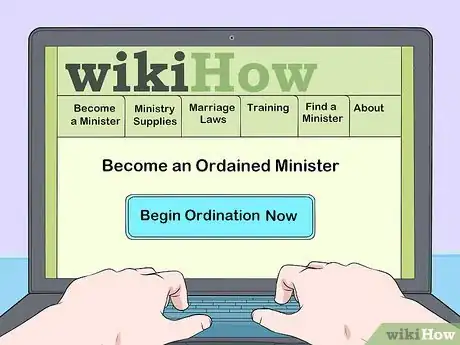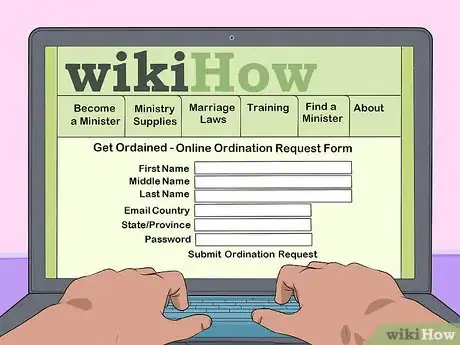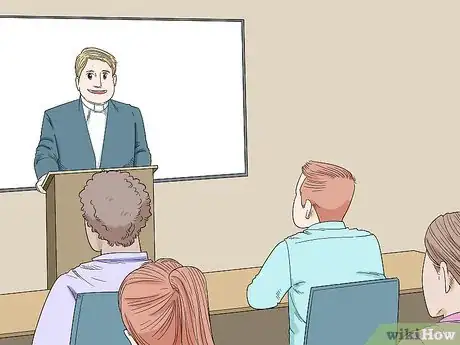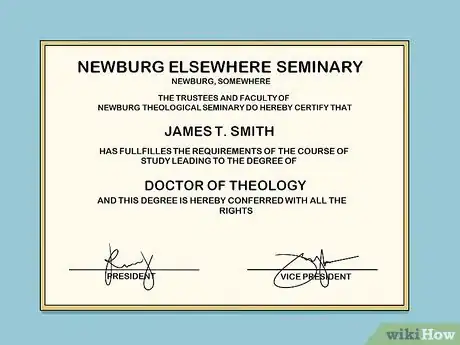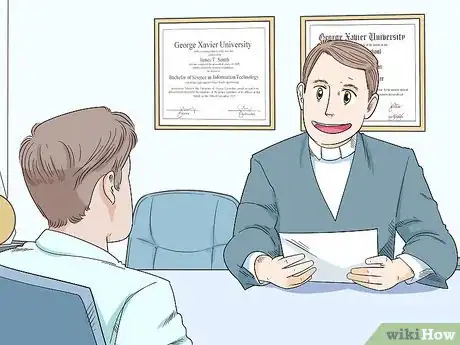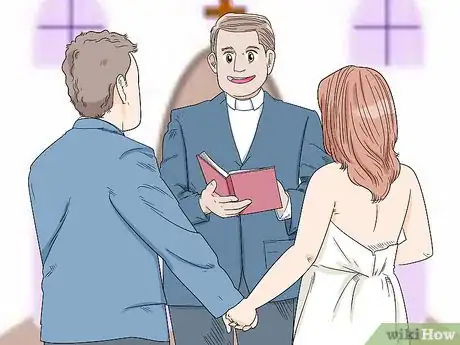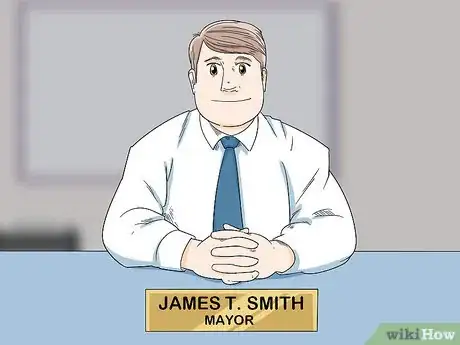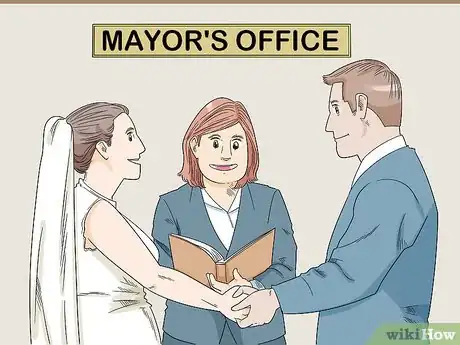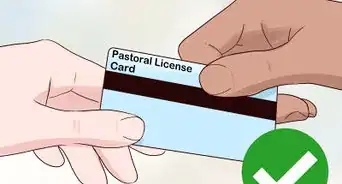wikiHow is a “wiki,” similar to Wikipedia, which means that many of our articles are co-written by multiple authors. To create this article, volunteer authors worked to edit and improve it over time.
There are 8 references cited in this article, which can be found at the bottom of the page.
This article has been viewed 45,650 times.
Learn more...
Officiating a wedding means playing a central role in one of the most important days of two people's lives. Each state has different eligibility requirements for its officiants, and New York is no different. In New York, there are three avenues to becoming a legal wedding officiant: becoming a minister over the internet, getting ordained through seminary school, or getting elected to government office.
Steps
Using Online Ordination
-
1Find a church that ordains people online. Online ordination has grown in popularity in recent years. In order to keep costs down and make the ceremony more personal, engaged couples are increasingly asking friends or family members to get ordained online and officiate their wedding. New York recognizes ordinations received over the internet as valid, though in some cases additional paperwork is required.[1]
- There are a number of churches that provide online ordinations, so do some research and choose one that you think is a good fit.
- While most online churches offer free ordinations, you generally have to pay for official documents like ordination credentials.
- You'll need to make sure that the church meets New York's legal definition of a church; otherwise, the state may not view your ordination as legitimate. For example, clergy ordained by the Universal Life Church are typically not recognized by the state.[2] [3]
-
2Request ordination. Applying for ordination usually involves filling out a simple online form with basic information such as your name and email address.[4]
- Applicants are generally not required to pass any sort of religious tests.
- Most organizations instantly approve ordinations, so the entire process takes only a matter of minutes.
Advertisement -
3Start performing weddings. As soon as you receive confirmation that your ordination request was accepted, you’ll be able to perform legal wedding ceremonies. If the ceremony will be held outside of New York City, ministers aren’t required to register with local marriage officials. However, if the wedding is within city limits, additional paperwork must be submitted.[5]
Using Seminary Ordination
-
1Determine your denomination preference. Seminary schools generally welcome students from a range of denominations, but deciding where exactly you fall on the spectrum will be helpful in finding a program that closely matches your beliefs and values.
-
2Join a church.[6] Establishing yourself within a faith community offers numerous benefits when pursuing a seminary degree. By joining a church, you’ll be able to consult with faith leaders and seminary-trained ministers who can help shed light on the ordination process. They might also connect you with seminary school officials or give you a recommendation to use with your application.
-
3Apply for seminary school.[7] The application process will vary depending on the school you have chosen, as some have more stringent requirements than others.
- Standard programs may admit applicants with only a high school diploma, but more advanced programs might require a college degree from a four-year university.
- The application process could include interviews, written essays, letters of recommendation, or other materials.
-
4Get your degree. Once enrolled, you will earn your degree by completing a series of courses, just like in a regular college.
- Degree programs typically involve a mix of required courses and electives, and can generally take between 2-4 years to complete.
- Since seminary school costs closely mirror those of traditional universities, it’s important to plan out your degree path and budget accordingly.
-
5Seek out a ministerial position. After earning your degree, you will then apply for open ministerial positions.
- This generally involves a lengthy interview process with church leaders. Questions might include your reasons for becoming a minister, how your beliefs align with those of the church, and what your plans for the future might be.
- After the interview you could be offered a position outright, or asked to complete a trial period.
-
6Start performing wedding ceremonies. Upon receiving your ordination, you’ll be able to legally officiate marriages. New York recognizes ministerial credentials from any state, so even if you are not based in New York, you will still have authority to perform weddings.
Getting Elected to Government Office
-
1Run for office. If you’re hoping to officiate weddings in New York but don’t want to become an ordained minister, you have one other potential option: get elected to government office.
- New York City wedding officiant eligibility is extended to certain government positions such as the mayor (or former mayor), local judges, and county clerks, among others. [8]
- Outside of New York City, the list of government officials officials that can officiate weddings include the mayor (or a former mayor), city clerks, and judges within certain districts. [9]
-
2Start performing wedding ceremonies. If you’re fortunate enough to get elected to one such position, you’ll be eligible to perform legal marriage ceremonies upon taking office.
Warnings
- For weddings within New York City, religious officiants must register with city officials. In order to register, ministers must provide proof of their ordination, a copy of their church’s articles of incorporation, and a statement of authorization from a church leader. [10]⧼thumbs_response⧽
- Ship captains are not eligible to perform weddings in New York state.[11]⧼thumbs_response⧽
- A marriage license must be obtained by the couple getting married. The license must be acquired before the wedding can take place.[12]⧼thumbs_response⧽
- The officiant will sign the license along with the couple, then the officiant will return the license to be filed.⧼thumbs_response⧽
- The marriage license must be error free when returned, or else a new license will have to be purchased if the license is rejected due to errors.⧼thumbs_response⧽
References
- ↑ https://www.cityclerk.nyc.gov/content/marriage-officiant-registration
- ↑ https://verdict.justia.com/2013/05/14/a-difference-of-opinion
- ↑ https://www.jameslafevor.com/it-was-a-great-wedding-but-was-it-legal/
- ↑ https://withjoy.com/blog/get-ordained-online-6-easy-steps/
- ↑ https://www.cityclerk.nyc.gov/content/marriage-officiant-registration
- ↑ https://www.kencollins.com/answers/question-46.htm
- ↑ https://www.kencollins.com/answers/question-46.htm
- ↑ http://www.cityclerk.nyc.gov/html/marriage/officiant_reg.shtml#eligible
- ↑ https://www.health.ny.gov/publications/4210/
About This Article
The easiest way to become a wedding officiant in New York is to get ordained by a church online. Generally, you don’t need to pass any religious tests or meet other requirements. Just make sure the church is recognized by the state and fill out the relevant form on their website. For weddings taking place in New York City, you'll also need to register with city officials. Clergymen can also perform wedding ceremonies, but this takes a lot more time and effort. You’ll need to join a church, get a degree from a seminary school, then land a ministerial position. Once you’re ordained, you’ll be free to legally officiate marriages. For more tips, including what to expect in a ministerial interview, read on!
